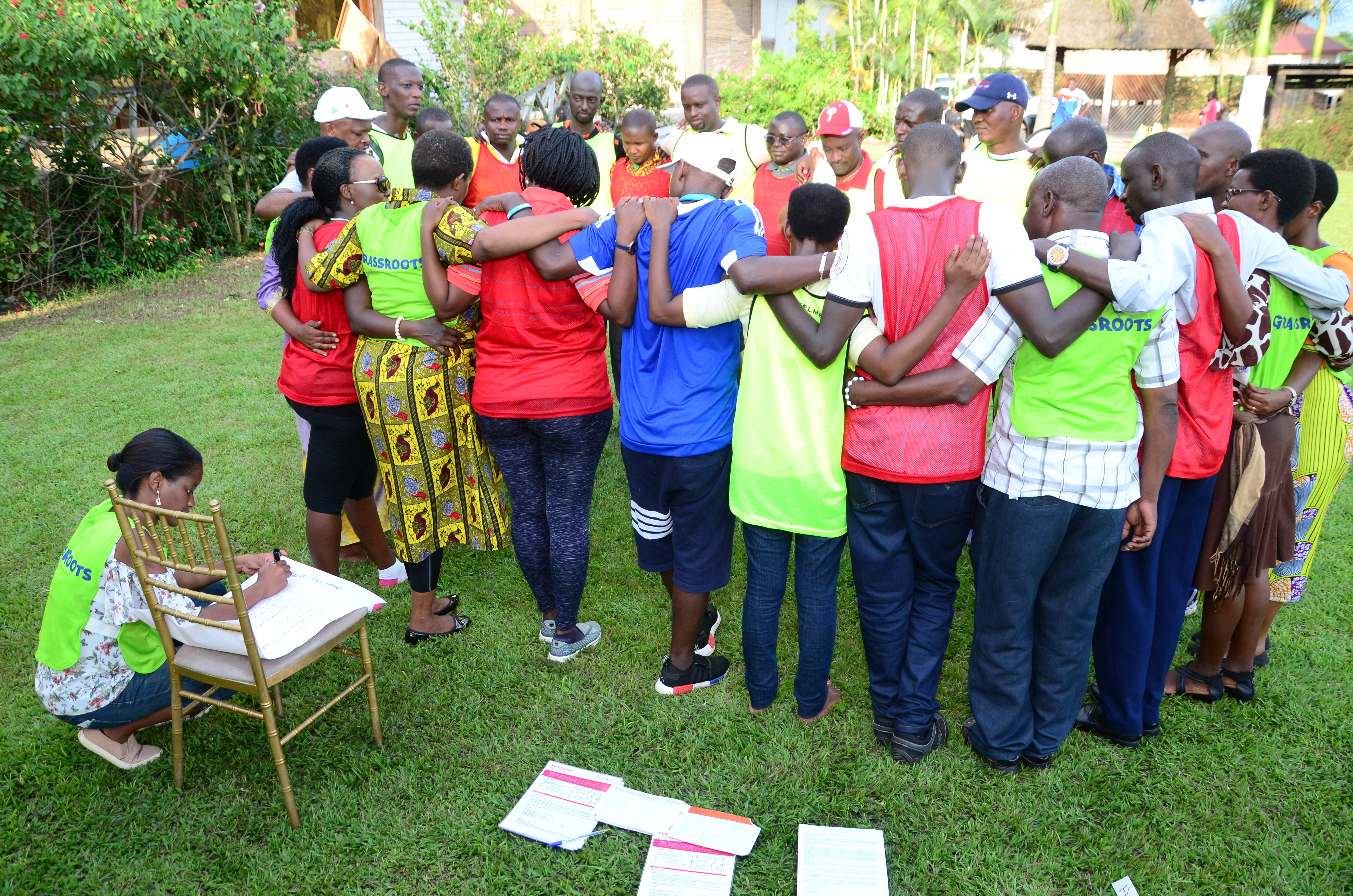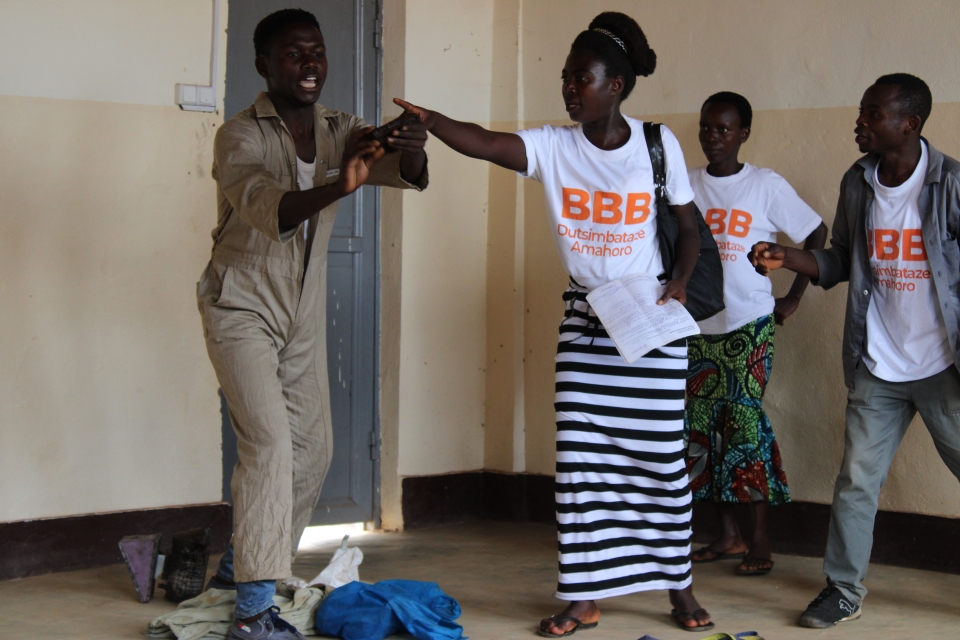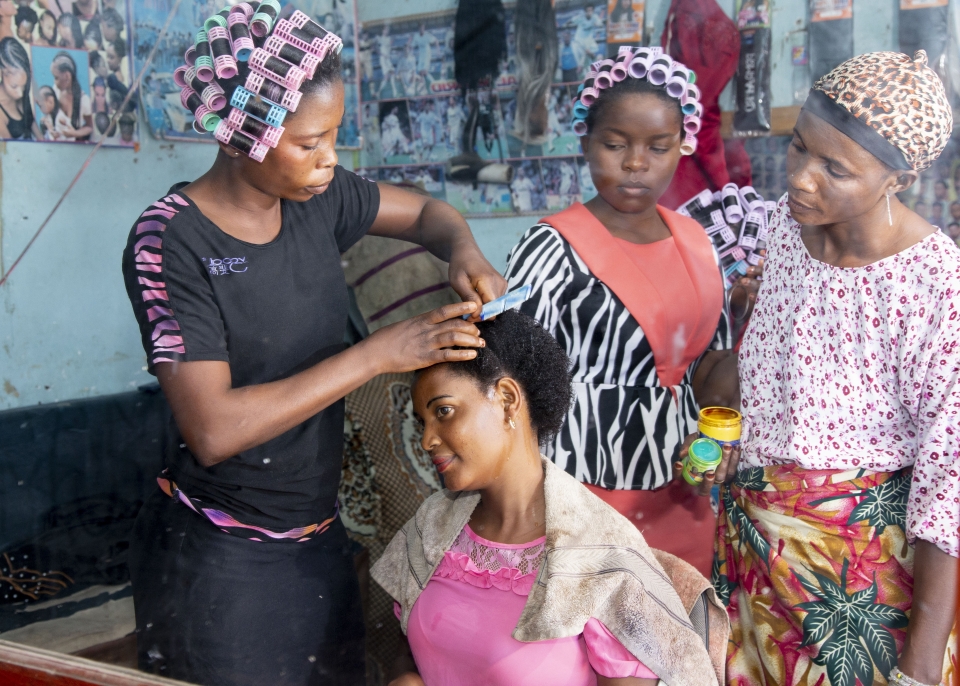
Community members come together as part of the Building Bridges in Burundi program. AFSC Burundi
Violette is a schoolteacher in her community in Burundi. She teaches her students about the need for peaceful coexistence, helping them understand why it’s important to promote dialogue and resolve conflicts without violence. Her hope is that her students will contribute to a future where all Burundians can thrive in safety and lasting peace.
That vision is very different from what Violette experienced as a child. She was only nine years old in 1993, the start of one of Burundi’s civil wars. Violette witnessed the massacre of her mother and father. She also survived a blow to the head with a machete.
During the war, mass killings along ethnic lines claimed the lives of hundreds of thousands of Burundians. Many more were displaced, fleeing to neighboring countries.
Like most Burundians, Violette was left with deep psychological and emotional scars. She developed a hatred for people who belonged to the other ethnic group. It affected how she interacted with others and lived her everyday life.
That changed in 2018, when Violette began taking part in the Building Bridges in Burundi Program (BBB Dutsimbataze Amahoro in Kirundi language). The five-year program is part of AFSC’s peacebuilding work in Burundi. It is funded by the Ministry of Foreign Affairs of the Kingdom of the Netherlands through its Addressing Root Causes (ARC) fund. And it is implemented by four international organizations and nine local partner organizations.
Since its inception, the program has supported tens of thousands of Burundians working to reknit the fabric of their communities after years of conflict. They are healing from the trauma of violence. They are supporting each other in building small businesses and economic resilience for all. They are gradually reconciling and rebuilding a sense of community.
The program “made me understand that violations committed by a single person cannot be attributed to a whole group of people,” Violette says. After joining the program, she decided to find the person who killed her parents and allowed him to meet with her. “It was difficult to sit face to face with the one who slaughtered my family, but I was able to forgive him,” she says.
As AFSC staff in Burundi, we have been inspired by the stories of people like Violette. It takes courage and commitment to build a space where people can hold anger and forgiveness, grief, and hope at the same time—reckoning with the past while collaborating toward a just, peaceful future for all.
The Building Bridges Program has supported their efforts in a variety of ways, at different levels of society. That includes:

Resolving disputes through community-based reconciliation
Sometimes, formal systems of justice may fail to address the root causes of conflicts. They often focus on punishment and retribution, instead of healing and transformation that communities need.
As part of the program, Burundians are now using alternative, community-led structures to look into the unaddressed legacies of conflicts—mainly land and family disputes. Paralegals and mediators are key in this effort.
Committees of diverse community members—called “cluster level associations”—also assist in conflict resolution. In addition, they organize workshops, sporting events, and other activities of common interest that bring together people from different ethnic, religious, and political backgrounds.
Other local committees focus on good governance. They build relationships with local authorities to strengthen the social contract between government officials, civil society, and communities.
Because these informal structures are made up of trusted members of the community, they have credibility in resolving disputes. And increasingly, more and more community members are looking to them for guidance and leadership.
Addressing longstanding tensions
As part of the Building Bridges program, many Burundians are now taking part in “transitional justice” processes. This is one approach to redress violence of the past—while acting on opportunities to transform conditions at the roots of these harms.
With transitional justice, Burundians recognize their rights to call for accountability for harms. And they see the value in social and community-based reconciliation. With help from partners organizations, community members facilitate the reconciliation process, working with local authorities and all parties.
The results of these collective efforts are remarkable. In 2020 alone, 21,067 people were trained or participated in transitional justice sessions. Victims and perpetrators have agreed to meet and talk with each other. Many have found ways to forgive. Property stolen years ago has been returned.
All these efforts to resolve conflicts have significantly reduced grievances and clashes within the communities.

Building peacebuilding skills and economic security
Since the start of Building Bridges program, more than 65,025 Burundians have participated in trainings and sensitizations on conflict prevention and conflict resolution. They also take part in trauma healing sessions and receive support from psychologists and other mental health professionals.
More than 18,000 participants are also active in community savings and loan groups (known as self-help groups)—made up of youth and women from different backgrounds. They work together to support each other’s businesses and other efforts to generate income. These groups foster collaboration and a sense of belonging—while boosting economic resilience from the grassroots. Over the past year, most participants—93%—reported growth in their business activities, despite the challenges of the pandemic.
Looking ahead
Today Burundians are breaking cycles of violence. They are building bridges among divided community members. They are healing from the past to build bridges among divided community members. And they are working together toward a shared, sustainable peace for today—and future generations.
Thank you for your support!